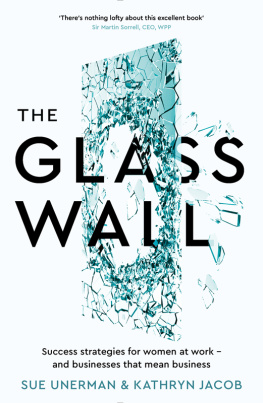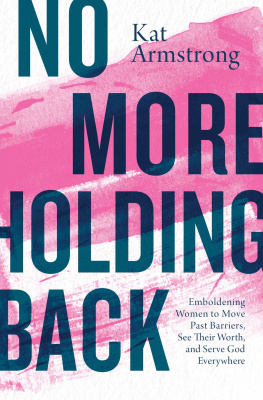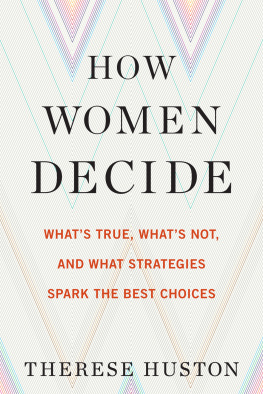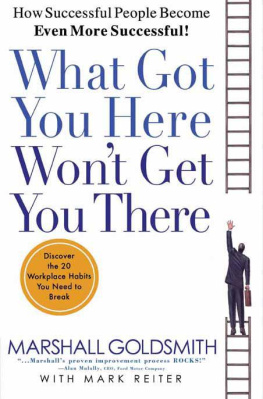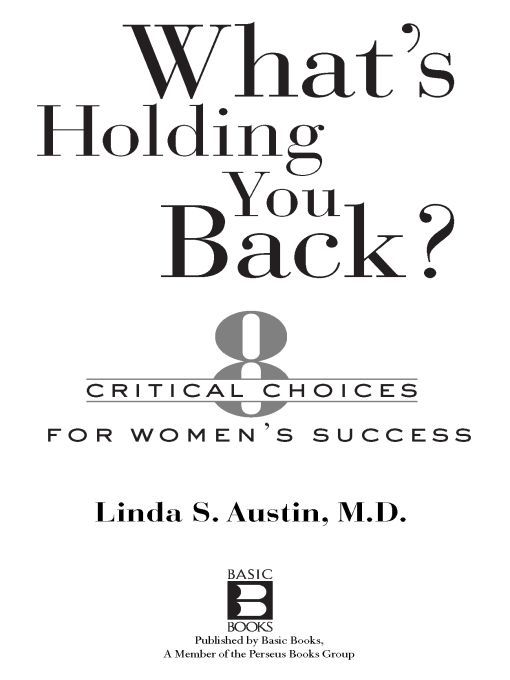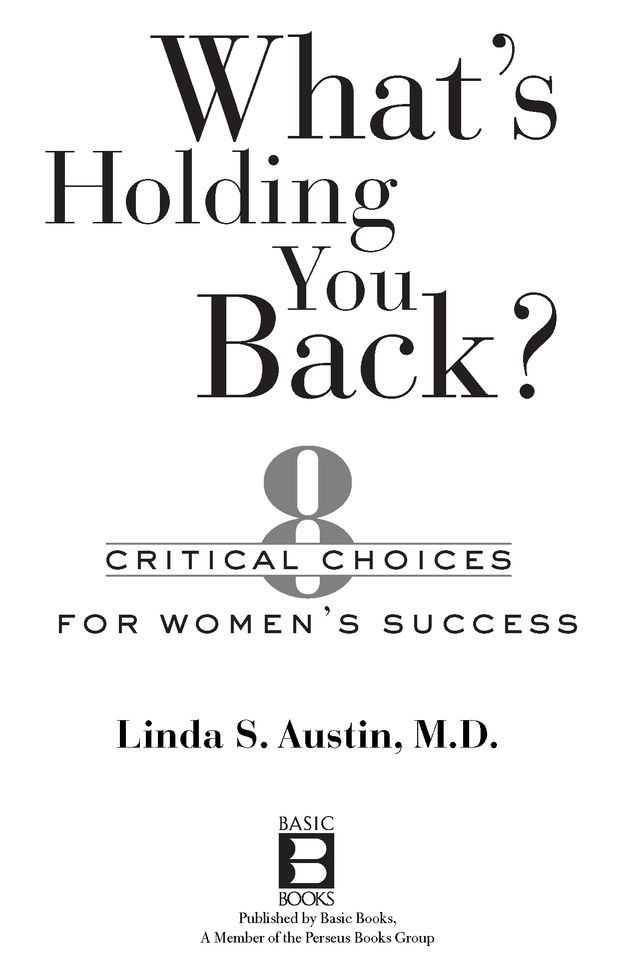Table of Contents
To my parents, Robert and Elpidia Gonzalez Smith,
and my children, Matt and Stephanie Austin
You see, I want a lot.
Perhaps I want everything:
the darkness that comes with every infinite fall
and the shivering blaze of every step up.
So many live on and want nothing,
and are raised to the rank of prince
by the slippery ease of their light judgments.
But what you love to see are faces
that do work and feel thirst.
You love most of all those who need you
as they need a crowbar or a hoe.
You have not grown old, and it is not too late
to dive into your increasing depths
where life calmly gives out its own secret.
RAINER MARIA RILKE
PREFACE TO THE PAPERBACK EDITION
AT SEVERAL POINTS IN MY CAREER as an academic physician, I searched for a book that would provide me with answers to questions that concerned me. Why was the direction of my career path more meandering than that of my male colleagues? Why was I drawn to such a wide range of interests, and was that a strength or a weakness? Why had the men hit certain career markers earlier than I hadwas it simply a matter of home responsibilities, or were there other, more subtle, reasons?
As I talked about these questions with my female colleagues, I realized that most of them struggled with the same issues. They, too, loved their careers but were puzzled that they were not advancing in step with their male colleagues. They, too, recognized that they viewed achievement from a different perspective than the men. They, too, wanted to understand more about their own personal psychology of success.
And so I wrote the book that I wish had been available to me earlier in my life. The project gave me an opportunity to research and analyze questions about female psychology that had not been adequately explored elsewhere. It has been thrilling to share these insights both with young women who have their career lives before them, and with those of us who seek to achieve in midlife and beyond.
When one awaits the publication of a book, there is a curious mixture of relief at the completion of a large project and anxiety over how the work will be received. I had two specific sources of anxiety. The first was that I would be accused of saying that women should think more like men. Indeed, the very first article about the book, which appeared in my hometown newspaper, carried the headline, Psychiatrist Thinks Women Should Think More Like Men. But this was not at all what I was saying in the book. As a psychiatrist, I would never tell one person that she should think like another, much less that a woman should think like a man! The challenge for both men and women is to simply become more human, by developing a broad repertoire of ways of thinking, feeling, and behaving that vary as the situation demands.
The second anxiety, fortunately, did not materialize. I had worried that the book would be read as a denial of the discrimination that traditionally has held women back, that I would be misread as telling women to get over it. In fact, many of the warmest responses came from old-guard feminists who welcomed the encouragement I gave women to look first within and then reach for the stars.
Along with these jitters came wonderful surprises. To my delight, many men bought the book to help guide their daughters, wives, and coworkers. From the letters and calls Ive receivedand the lively discussions that have followed my book signingsI can tell that Whats Holding You Back? has helped women of all ages and levels of career development, including many who never saw themselves as career women. I have also been glad to see different women resonate with different topics I address. While few women grapple with all eight of the critical choices, virtually all women seem to grapple with at least some of these choices. I trust as you read the book, you will focus on the issues that are most relevant to you.
And may nothing hold you back!
INTRODUCTION
Breaking the Psychological Glass Ceiling
No one will ever create a bolder vision of your life than you are able to envision for yourself.
IT WAS THE FIRST SESSION of a psychotherapy course I taught to the third-year psychiatry residents. In what way, I asked brightly, would each of you like to be great?
I posed my question in part to warm the room, to encourage the residents to let me know them as individuals. But the question itself intrigued me, for I had begun to wonder how much of womens career trajectories was determined by whether they could dream of greatness.
The men in the group had a variety of responses, reflecting a mixture of personal and professional goals; almost all, however, said they wanted to be great psychiatrists. Six of the seven women in the group replied: I want to be a great mother. Only one said, I want to be a great doctor and a great mother.
I was truly taken aback by the womens responses. Their inability to dream of professional greatness astounded me because of who they were. Their average age was about thirty. Each had graduated with sterling grades from four-year colleges, then completed four years of medical school, and were now in the third of their four years of residency. They were women who had sacrificed enormously for their education and careers, and each stood on the brink of finally being able to enjoy the fruits of her immense personal investment. Each of them would be a practicing physician in two years. With determination and discipline, each had the potential to become a great physician. Yet, in their twenty-third year of formal education, something restricted their ability to experience and acknowledge their full ambition.
Surely these women had been initially motivated by deep ambition. Had they become so worn down in the course of their long educational journey that their drive was now flagging? Were the pressures, needsand pleasuresof family living catching up with them, making them feel it was necessary to limit their aspirations? And if so, why wasnt this true for their male counterparts? Had their young lives as achievers become too taxing, too conflicted, too inconvenient for them to hold on to their visions of accomplishment? Before my eyes, I saw the course of female ambition personified.
THE PSYCHOLOGICAL GLASS CEILING
Much has been written about the infamous glass ceiling, the external barrier in the corporate and professional worlds that limits womens career advancement. This book is about the psychological glass ceiling that we women unconsciously erect within our minds. Despite its invisibility, it influences every decision we make in our careers and is far more life-defining than any external barrier could be.
At the beginning of my own professional training at twenty-one, I believed that the obstacles impeding womens drive to the top were, in fact, all out there. It was 1973 and I had just entered Duke Medical School. It was a historic time for women doctors: the number of women entering med school in the United States tripled between 1969 and 1974. It was the heyday of the womens liberation movement, and at Duke there was so much to liberate. A pathology professor showed


